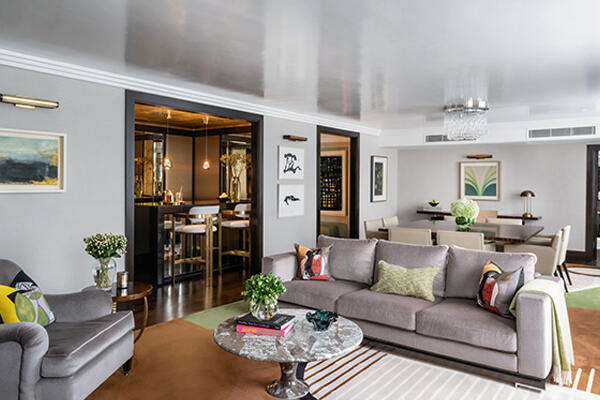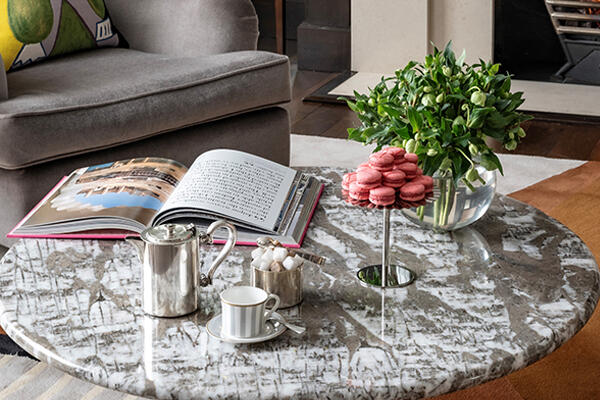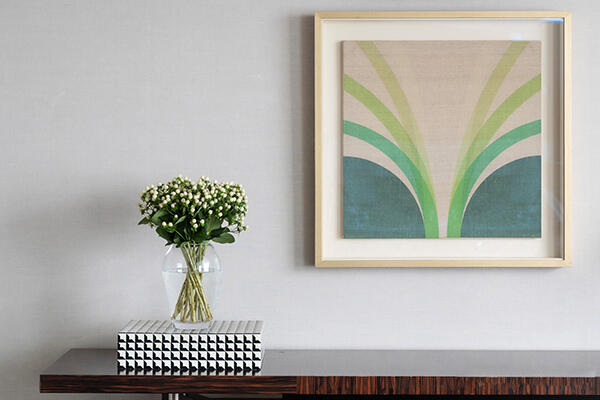Blog (The P.V. Doyle Suite)
Imagine a suite of rooms where paintings and sculpture by Ireland’s finest artists sit within an interior designed around them. They have a quiet presence. This is a story that tells itself over time. Your first impression could be a simple sense of elegance. The rooms are spacious, the furniture inviting, and there’s a tempting glint of mirror and polished brass from the private cocktail bar. The suite has legacy. Once called the Presidential Suite, it’s now named in honour of the hotel’s founder, P.V. Doyle (1923-88). Here, Audrey Hepburn and Marlon Brando once laid their heads (on separate occasions). David Bowie slept here too. You glance out the window. Far below, people are gathering outside McDaid’s pub. Wasn’t that the pub in James Joyce’s Ulysses? It was.
Unpack. Relax. Explore. Gradually, the artwork reveals itself. The living room is centred around a rug, made in pure wool and soft underfoot. Both sofas and dining suite sit easily upon it, with room to spare. The rug’s gentle geometries, organic greens and earth tones remind you of the Irish landscape, but there’s something else going on here too. And not just the show-stopping postmodern table in two-toned marble by Angelo Mangiarotti (1921-2012) which forms the centrepiece of the room.
Did you notice the tapestry on the left as you came in? The design of the suite in general, and the rug in particular, takes its lead from this spectacular tapestry, Sol y sombre (it translates as light and shade) by one of Ireland’s most famous twentieth-century artists, Louis le Brocquy (1916-2012). The tapestry followed his research trip to Spain in 1955. Le Brocquy travelled to create designs for curtain fabrics but the journey transformed his own work too. The Irish art critic Dorothy Walker wrote: “The Spanish light literally turned his world inside out. Shadows became more real than substance, hot colours entered the shade, and cool colours the heat; matter dissolved in the blinding white light.”
It’s no accident then, that the bright and graphic cushions scattered around the suite are based on works by the Spanish artist, Pablo Picasso. The cushions come from tapestry workshops of Jules Pansu and are woven in Les Tissages de la Lys, France, with the agreement of the Picasso Administration.
Louis le Brocquy once described painting as “an archaeology of the spirit.” You can see what he means. A pair of lithographic brush drawings on the wall beside the bar – Death of Fraech and Warrior Killed – both come from his illustrations for The Táin. The warlike Irish epic Táin Bó Cúailnge (or the Cattle Raid of Cooley) dates from the twelfth century, but le Brocquy’s iconic brush drawings were created for a twentieth-century translation by the poet Thomas Kinsella (Dolmen Press, 1969).
There’s another Irish legend in the room. Fount, a silkscreen by artist Patrick Scott, hangs above a mid-century Italian console table with Art Deco detailing. Scott was famous for using gold leaf in his works but he wasn’t one to talk about it. When pressed, he said that he “liked the look of it.” In 2021, the Irish postal service, An Post, marked the centenaryof Scott’s birth with a series of postage stamps of his gold paintings.
Further exploration reveals more contemporary Irish artwork, from Summer Grass by Leah Beggs to a simple but sophisticated ebonised oak bowl by woodturner Alan Meredith. It’s called Dearcán Bowl #44 (dearcán is the Irish for acorn). But, by this stage, someone in the party will have lost their heart to Stephanie Hess’ bronze sculpture, March Hare.
Because who doesn’t love a mad March hare?
The works in the P.V. Doyle suite are part of a wider art collection on view throughout the hotel and especially in The Gallery.




